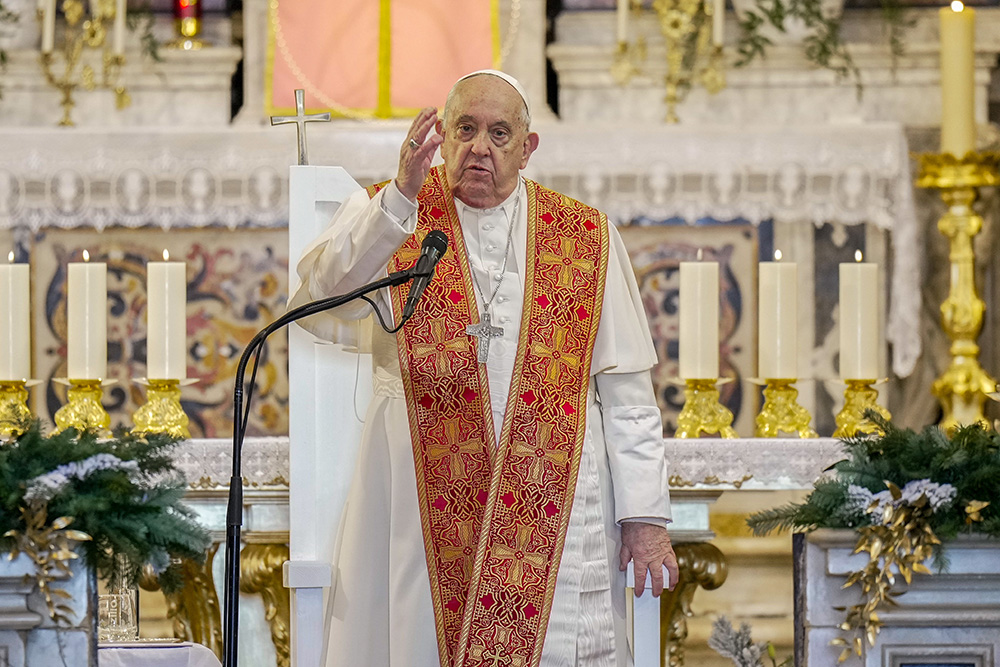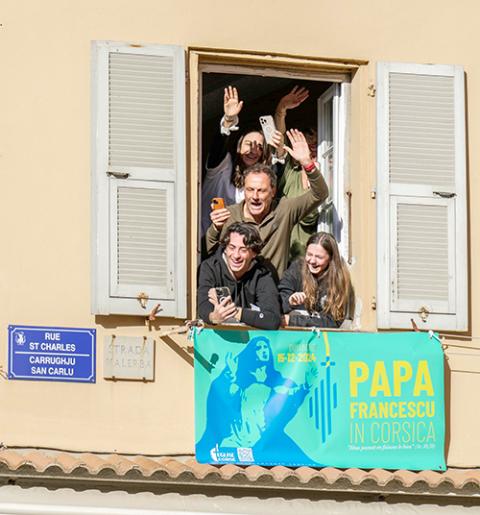
Pope Francis gives his blessing after praying the Angelus with local bishops, priests, deacons, consecrated persons and seminarians at the Cathedral of Our Lady of the Assumption in Ajaccio, France, Dec. 15. (CNS/Lola Gomez)
This article was updated at 1 p.m. CST with further events.
Corsica's most famous son, Napoleon Bonaparte, ushered in a complicated era of church-state relations in France following his 19th-century military conquests. And on Dec. 15, Pope Francis used the emperor's homeland as a backdrop to warn against reducing faith to a "private affair."
Instead, the pope encouraged a "healthy secularity" where there is an "evolving and dynamic" relationship between church and civil authorities.
Politics, said the pope, should not "manipulate religion" and religious practice must be "free from a politics of self-interest, which at times is barely compatible with, if not downright contrary to, religious belief."
The pontiff's whirlwind nine-hour visit here was to close out a conference on "Popular Religiosity in the Mediterranean." While secularism may be widespread throughout France, Corsicans have maintained their centuries-long traditions of processions, devotions, lay associations and other forms of popular piety.
Today, only one-quarter of France identifies as Catholic — a decline of over 20% in just over a decade. But here on the French isle, with a population of just 340,000, a different story is unfolding, with as many as 90% of its residents still identifying as Catholic and with adult baptisms and confirmations on the rise.
During his keynote address to the conference — attended by some 400 academics, priests and religious leaders from throughout Europe — the pope acknowledged that "the question of God seems to be retreating as people become increasingly indifferent to his presence and his word."

People greet Pope Francis from a window as he arrives at the Cathedral of Our Lady of the Assumption for a meeting with the local Catholic community in Ajaccio, France, Dec. 15. (CNS/Lola Gomez)
But Papa Francescu, as he is called in the Corsican language, insisted this was not cause for despair nor reason to pit Christian culture against secular culture.
"Instead, it is important to acknowledge a mutual openness between these two horizons," said the pope.
"Believers are increasingly open to, and at peace with, the possibility of practicing their faith without imposing it, being a leaven within the world and in their own communities," he continued. "Nonbelievers or those who have distanced themselves from religious practice are not strangers to the search for truth, justice and solidarity."
The pope also noted that there are many people who do not practice any religion, but still "carry in their hearts a great thirst, a search for meaning, which leads them to ponder the mystery of life and to seek out core values for the common good."
Upon his arrival here on Sunday morning, Francis — the first pope to ever visit Corsica — spent some 30 minutes greeting the tens of thousands of locals who had spilled out onto the streets to greet him. On an island where there is a growing independence movement, Corsican flags were proudly flown alongside Holy See banners. The French tricolor, however, was in short supply.
While the pope stopped at various points to kiss babies and greet small children, the nearly 88-year-old Francis dedicated his longest pause to bless the city's oldest resident: a 108-year-old Corsican woman who had come to greet him.
Despite a gravelly voice and appearing weary at times, Francis — who recently fell and bruised his chin — seemed energized by being back on the road on his 47th international trip.
As his popemobile made its way along the streets that ran parallel to the sun-filled Mediterranean Sea, the religiosity of Ajaccio's residents was on full display. Many residents held out their rosaries and the pope made a special stop to bless a statue of the Virgin Mary.
During his address to the conference, the pope said that popular religious piety can help in "uniting hearts and building communities."
The fruits of these tangible devotions, he said, can be witnessed both inside the church and society, as a whole through a commitment to the "promotion of human development, social progress and care for creation, all in the name of charity."
Even those who do not regularly practice the faith, Francis said, are still beneficiaries of popular piety, as it provides an opportunity to "experience their roots and affections, as well as to encounter ideals and values that they find useful for their own lives and for society."
Advertisement
Francis — who will turn 88 on Dec. 17 — has visited France three times over the course of his nearly 12-year papacy. Each time, however, he has bypassed its capital of Paris, including turning down an invitation to attend last weekend's reopening of Notre Dame Cathedral.
Instead, the pontiff has opted to utilize his international travels to shore up the faith in smaller countries and cities, such as here in Corsica.
At an afternoon Mass at the city's Place d'Austerlitz, the pope told thousands of faithful to keep their faith alive through a spirit of joy.
In the outdoor plaza just steps away from the city's major shopping district, Francis offered a pointed criticism of wealthy societies where consumerism has replaced the practice of faith.
"Such societies grow old; they remain unsatisfied, since they no longer know how to give," the pope lamented. "If we live only for ourselves, we will never find happiness."
Even prior to becoming pope in 2013, Francis has long been concerned with encouraging the faith of ordinary believers — many of whom have passed along their Catholic practices through simple, if sometimes intense, acts of religious piety and devotion.
Emilce Cuda, an Argentine theologian and secretary of the Vatican's Pontifical Commission for Latin America, told the National Catholic Reporter that Francis emphasized this aspect of the faith in the first programmatic document of his papacy, his 2013 exhortation "The Joy of the Gospel."
Cuda noted that Francis' Latin American experience with popular devotion has been formative for him and that there has been a "revolutionary" development in the way the church has come to understand such practices.
"It is a 'democratization' of mysticism, not only for the great saints, but also at the level of the people," she said.
Sitting underneath an imposing statue of France's most iconic secular saint, Napoleon, the pope said that the task of believers is to be a witness of joy "to everyone and in every place," even amid widespread despair in the world.
Prior to leaving Corsica, the pope held a private meeting with French President Emmanuel Macron. The president presented the pontiff a book on Notre Dame and remained on the red carpet as the pope boarded his plane.
Once airborne back to Rome, the pope came back to briefly thank reporters accompanying him. It marked the first time in his international travels that Francis did not hold a customary in-flight press conference.
He was then presented with a birthday cake by Valentina Alazraki, president of the Association of International Journalists Accredited to the Vatican — with the pope telling journalists he would see them on the next trip.
To date, no further international travels have been confirmed, but Francis has said he hopes to travel to Turkey to mark the 1,700th anniversary of the Council of Nicaea in 2025.
Reporting from Rome was made possible in part by the generosity of Joan and Bob McGrath.








